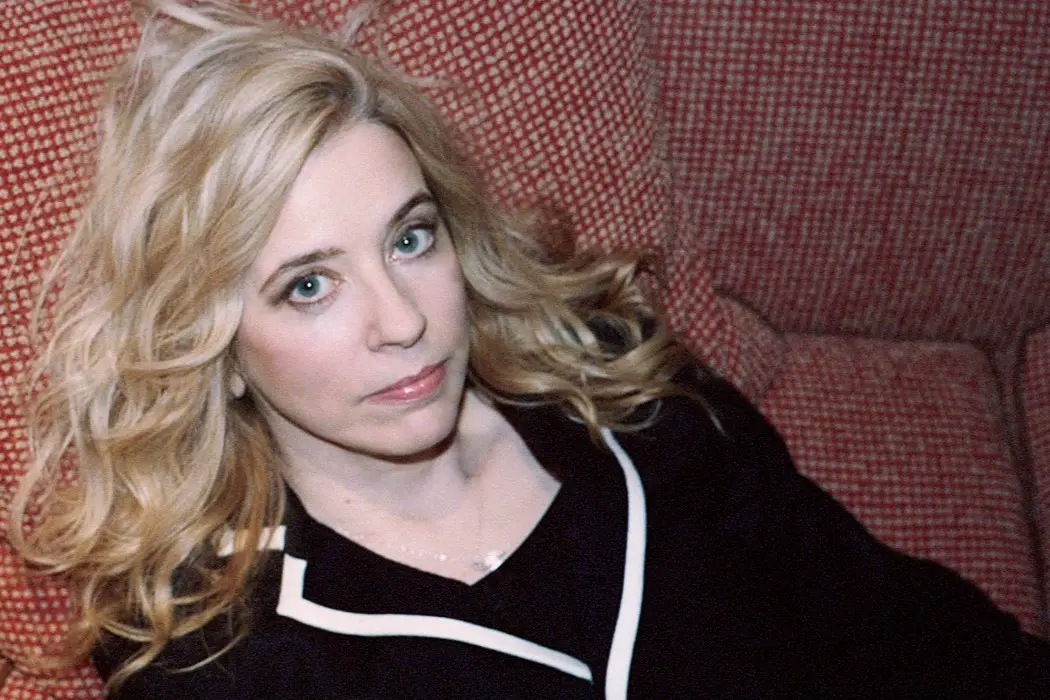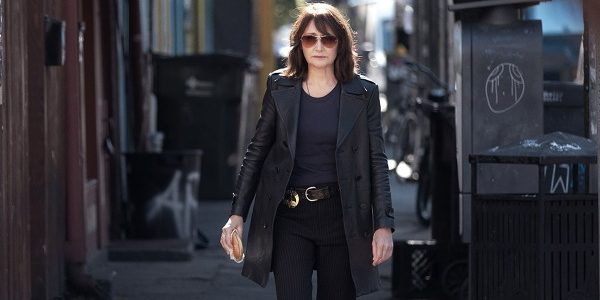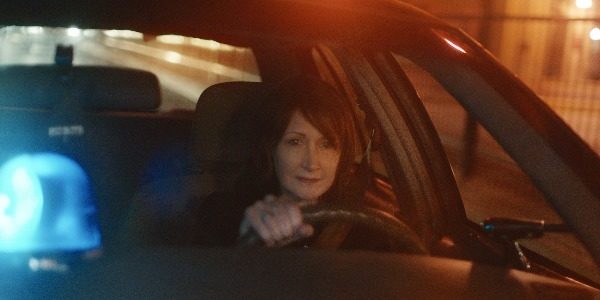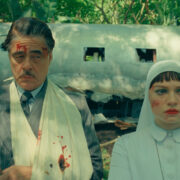Interview With Carol Morley, Director Of OUT OF BLUE

Alistair is a 25 year old writer based in Cambridge.…
British director Carol Morley makes boldly original, thought-provoking films that stay with you. Her 2011 documentary-narrative hybrid Dreams of a Life dug into the final days of a London woman whose corpse remained undiscovered for over two years following her death, while 2014’s The Falling examined adolescent angst through the prism of mass hysteria. For her latest, she’s adapting somebody else’s work for the first time (in this case, Martin Amis‘ 1997 novel Night Train), and making her first American film.
Out of Blue is her most polarising work to date, enrapturing some audiences while confounding and alienating others. I was lucky to get a chance to speak to her about this new film, why she decided to adapt somebody else’s work for the first time, and why Patricia Clarkson is a gay icon.
Alistair Ryder for Film Inquiry: Hi Carol, how are you today? Whereabouts in the world are you?
Carol Morley: I’m good, I’m in a cafe drinking a very large cappuccino. I’m in London at the minute, I was in Cambridge last night doing a Q&A for the new film, and this morning I was on (BBC Radio 4 show) Woman’s Hour.
And how have the Q&A’s been so far? From what I can see, no two people are having the same reaction to Out of Blue.
Carol Morley: I know, I love it! It’s a bit of a privilege in a way, because you might see something in print or on twitter about your film, but to meet with an audience after a screening and hear their insights is brilliant. There is a shade to the film that I have in mind, but it’s designed to be an open film, so people are really bringing themselves to it, which is great.
I’m not going to ask you to reveal those secrets here, but I am curious as to why you chose to adapt the Martin Amis novel?
Carol Morley: Luc Roeg, who had produced The Falling, was with his dad Nicolas Roeg, who had wanted to do it for years, since the book came out in 1997. And I think it had a history, with scripts being written, but I never saw that – Luc just asked me if I wanted to adapt this book that he had the rights to. I read it, and I’d never thought of adapting a book let alone a Martin Amis book, but I was really drawn into the themes of cosmology and the female detective, and there was no restrictions on what I could do with the material. Martin Amis wasn’t involved, so it didn’t have to be a description of the book or anything, so once I knew I could run with the ideas I was interested in, I went for it. It was really interesting to have that freedom, and to collaborate with someone you don’t know, and will never meet, and take it in a different direction.

I’m not familiar with the source material, but it seems that a lot of people viewed it as a parody of detective fiction, and I was wondering if this was something you were conscious of when adapting it?
Carol Morley: Because it’s a literary setting, almost in a film noir, the book really exaggerates that world. For instance, the dialogue there is a Pulp Fiction type of noir, but I didn’t choose to go in that direction. If I did, it would probably have been like (Rian Johnson’s) Brick, which used that language which is charged with a kind of parody, where when you listen to it, you know it isn’t trying to be realistic. But I moved away from that, I was more interested in adding shades to it, creating back stories for the characters, creating a world through her mind. It’s not realism, because it’s viewed through her mind, but it’s definitely not a parody of detective fiction.
And in the book there’s no specified setting, what made you decide to locate the action in New Orleans?
Carol Morley: At first it was in Atlanta, and I chose Atlanta because of the south, and hiding something about its history with slavery and enslaved people. Now you go to those places and they’re renaming street signs, because they were named after slave owners, and they’re taking statues down, so there’s a very significant hiding and reshaping of the past. So I was really fascinated with setting something in Atlanta to start with, and I went there and hung out in the homicide department, but ultimately it got very busy as a filming town, and it became Patricia Clarkson’s idea to move it to New Orleans, because she’s from there.
It seemed perfect because she has a real connection to the city, and that’s what I always wanted Mike to have, to be born in the city where the film is set. And then people reading the script thought it was very New Orleanian, like the use of beads, because they throw beads at Mardi Gras, and when you go to New Orleans there’s just beads in the trees and everywhere you look. And there was lots of resonance elsewhere in the script, particularly the character of Jennifer Rockwell, who I’ve been told is a very New Orleanian character, so it was the perfect place really. But for me, the place had to feel like an extension of Mike – it had to come second to her.
When did Patricia Clarkson become involved with the project?
Carol Morley: We were casting it and sent her the finished screenplay, and three days later she came back and said she loved it. Then a week later I went to meet her – we set out a half hour window to meet, and we initially spent four hours together, she drank bourbon, I drank whiskey, and we bonded! She said she felt like there was a lot of Mike in her, and she really understood the character, and as every brilliant actor brings themselves to the part, that was the beginning really.
I always do quite an extensive history for each character, but she didn’t want to see that, she wanted to bring her own methodology to it. She’s such a brilliant actor, and she deserves more lead roles.
Did the way she perceived the character clash with the way you’d drawn out her backstory?
Carol Morley: Not at all! Patricia firmly believed that it was all in the page, so she’s always looking for clues within the screenplay. But I don’t think you want to hamper an actor – some say that they want to see all your research, not just into the character but the whole film, and others don’t want to see anything. It’s all about what the actor needs in order to shape the character, and it’s all on the page, but what she brought to it was a depth that only great actors can do, and you can’t write that. It’s all about casting; you cast the right person and they give your characters dimensions you would never even think about, and the best way of working with actors is working out how they like to work, so you’re not imposing or bombarding them with an approach that they don’t want.
After The Falling, were you consciously trying to make a character study about an older character exploring their identity? This feels like a companion piece in many ways.
Carol Morley: I like to make films you can get your teeth into, so the audience are part of that experience. With The Falling, there were lots of themes about mass psychogenic illness and mass hysteria, and all the aspects that would lead to an outbreak. With Out of Blue, it takes on these layers of the world she’s in, so for me, it’s natural instinct to gravitate towards the stories that I make. With The Falling it was discovering mass psychogenic illness and becoming really fascinated, with Out of Blue it was discovering the book and exploring its ideas on my own terms. I loved seeing everything through the female detective’s gaze, and I’m not sure how old she is in the book, but I knew I wanted to make her an older detective who had a history of working in homicide and at this point in her life was having a revelation about her own life.
It often gets given to young people, but throughout your life you can have revelations and difficult things happening and opening up, so I think depicting that is really important. Also, on our screens, it’s historically been restricted to leads by younger or youngish women, put a woman at the centre of the film and take her through that journey.

And as you said, it is really great to see Patricia Clarkson in a lead role!
Carol Morley: I know! It’s exciting to see that you don’t have to be a younger woman to lead a film like this, and that’s just the prejudice against older women. And that is a big problem in Hollywood about their depictions of women, and Patricia is not trying to be a young woman, and that’s why she looks brilliant. She’s just being her age, and that alone is really refreshing.
And there’s a recurring joke on gay film twitter where older actresses are cast as gay icons, and Patricia Clarkson is one of those gay icons. The scene where she gets on stage at the lap dancing club feels like something the gays are going to love when they see it.
Carol Morley: (Laughs) Again, you can interpret her sexuality how you like, but the film isn’t hypersexualised, it’s not looking at who she’s going to get off with now, but it’s open. Someone saw it recently and thought that the reporter character, Stella Honey (played by Devyn A. Tyler), was her love interest, and that Stella was Mike’s fantasy, and I love that! It’s not just saying “this is a gay and lesbian film”, it’s saying that this is a film for everybody and they’ll find themselves in it.
Older actresses becoming gay icons I think is often because they’re othered, and made outsiders as soon as they get to a certain age and the parts dry up. They become outside of society a bit, which is true for women in general as they get older, so I think that’s why the community would consider somebody iconic in that way.
After this experience adapting somebody else’s work, would you be open to doing it again?
Carol Morley: This is going to sound a bit weird, but I feel that the projects that I make are waiting to happen somehow. I wouldn’t actively read a book thinking “could I adapt this?”, and I definitely wouldn’t buy a book because I’d heard it’d be interesting to adapt. This came via Nicolas Roeg, who gave me his blessing to do it, and with The Falling before this, it felt it inevitable that I’d make it. The next film that I’m writing at the minute, Typist Artist Pirate King, felt like it was waiting for me to come across it. But the woman who is at the centre of that film (Audrey Amiss) felt that everything is connected, and she found it weird that I’d gone from adapting Martin Amis to writing about the life of Audrey Amiss!
I don’t actively search for story, I leave myself open and find myself getting fascinated by something, wanting to live it and making something from it. So never say never is the real answer! (laughs).
When will that be entering production?
Carol Morley: I’ve written it, but you can never tell. Hopefully not too far away – you don’t want to curse a film by saying when it’ll be ready!
Film Inquiry thanks Carol Morley for her time. Out of Blue is in US cinemas now, and opens in the UK on Friday, March 29th.
Does content like this matter to you?
Become a Member and support film journalism. Unlock access to all of Film Inquiry`s great articles. Join a community of like-minded readers who are passionate about cinema - get access to our private members Network, give back to independent filmmakers, and more.
Alistair is a 25 year old writer based in Cambridge. He has been writing about film since the start of 2014, and in addition to Film Inquiry, regularly contributes to Gay Essential and The Digital Fix, with additional bylines in Film Stories, the BFI and Vague Visages. Because of his work for Film Inquiry, he is a recognised member of GALECA, the Gay & Lesbian Entertainment Critics' Association.













